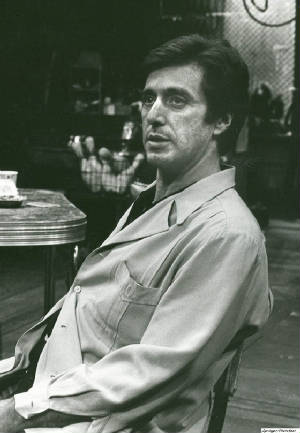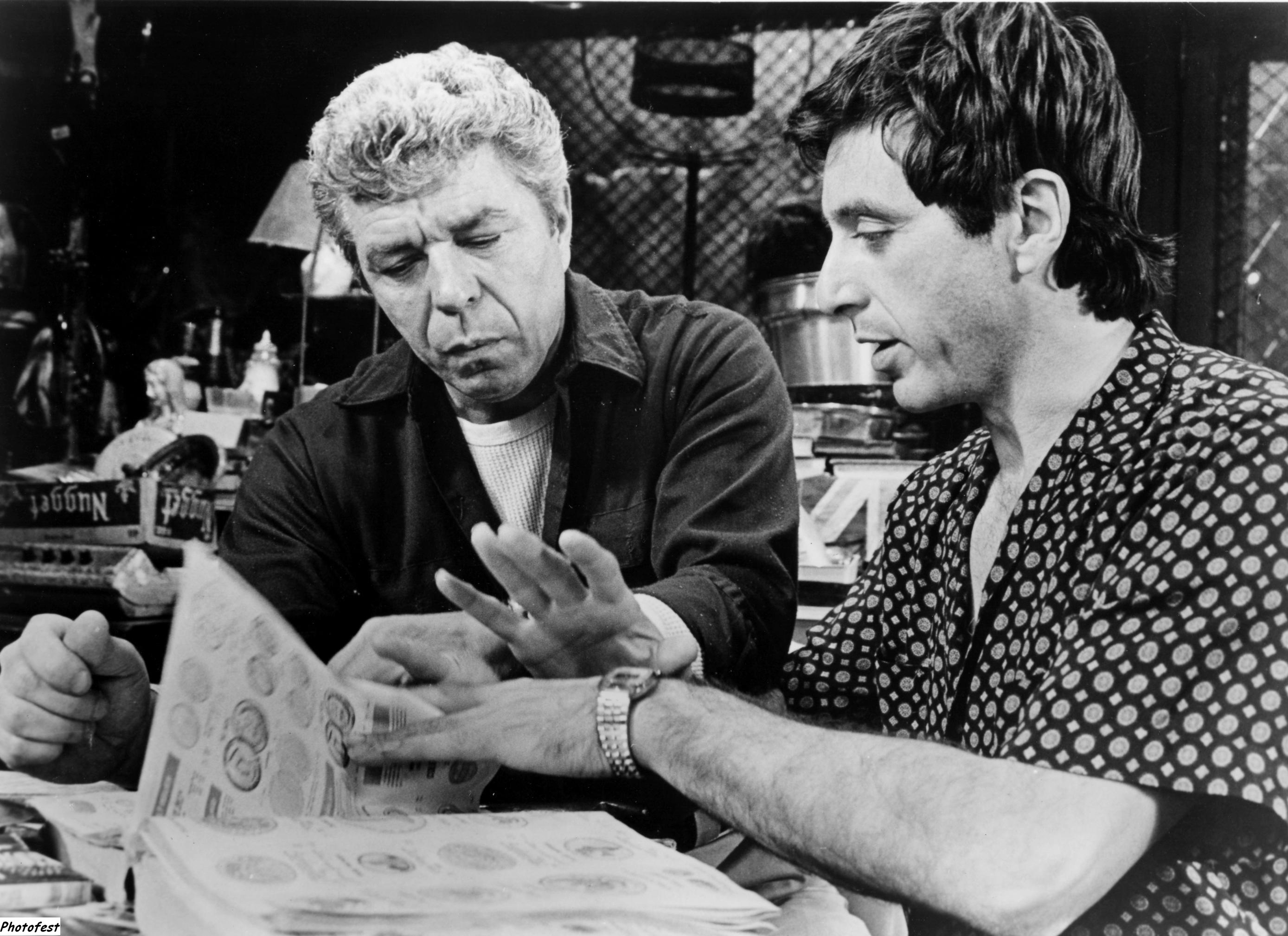|
|
|
| l to r, Al Pacino, James Hayden and J.J. Johnston, at the Circle in the Square, New York, 1980-81 |

"American Buffalo" takes place in '"Don's
Resale Shop,'" a secondhand junk store run by Don Dubrow, the play's protagonist. When the play opens, Don is instructing
Bob, his young protege, in the art of '"good business.'" Don offers pointers and advice which Bob accepts and
echoes. The two discuss last night's poker game, held in the shop, and the virtues of Fletcher, a character who is never
seen but who embodies all of the values that Don is trying to impart to Bob. Don offers other fatherly advice, such
as, '"Never skip breakfast'" and, '"it wouldn't kill you to take a vitamin.'" Their relationship, like that of a father
and son, is thus established.
"Their moment of quiet bonding is cut short when Teach, a friend of Don's enters the
shop...."
"Teach is suspicious about Don and Bob's conversation, and badgers Don into telling
him about its subject....Don...explains that a week ago, '"the guy'" came into the shop and offered him ninety dollars for
a Buffalo head nickel that Don had mixed up in random pieces of junk....Don has decided to steal it back from him-along with
any other coins he may have. He has enlisted Bob as his assistant and Bob has been watching '"the guy's'" house...."
"Teach, however, decides that he should '"go in'" instead of Bob....Teach...tells Don
that '"simply as a business proposition,'" Don '"cannot afford to take the chance'" of using Bob for the job."
...."While discussing how Teach will enter the house, Don becomes nervous about his
partner's lack of preparation and decides to call Fletcher and have him work with them....Teach reluctantly agrees and leaves
the shop to go take a nap. He will return at 11:00 in order to carry out their criminal plans."
...."Teach believes himself to be adept in the world of dealmaking and business.
Yet his circumstances reveal his skills to be unprofitable."
...."When Don tells him that Ruthie and Fletcher won at last night's poker game because
they are good card players, Teach ascribes their victories to cheating rather than skill. His anger at the world-and
at his own meager place in it-culminates in the end of the play, when he smashes the display cases in the junk shop, shouting
a new set of '"rules:'" '"There Is No Law. There Is No Right And Wrong. The World Is Lies. There Is
No Friendship.'"
Above excerpts from Enotes.com LLC


"In a startling burst of energy, he detonated onto the stage, jittering
and skittering and dodging around in aimlessly frantic motion as if no space were large enough to contain him. Consumed
by nervous tics, he twitched and scratched, obsessively hiking up his shoulder and twisting his neck in stiff, jerky, repetitive
circles. When he talked, his words exploded onto the audience in a bail of spray.
"Two years ago, in a performance greeted with critical acclaim, Al Pacino
created a memorable portrait of a character called Teach, a doomed small-time hood trying to pull off a petty burglary in
David Mamet's '"American Buffalo.'" Since that time, the actor has returned to the role as Teach returns to the subject
of his burglary, worrying it like a tenacious dog.
"After doing '"American Buffalo'" at the Long Wharf Theater in New Haven
in 1981, Mr. Pacino moved to the Off Broadway Circle in the Square. This year he has come back to the play for another
round; in August '"American Buffalo'" opened at the Kennedy Center in Washington, and on Thursday, Mr. Pacino will open on
Broadway at the Booth...."
"Mr. Pacino talks enthusiastically about his current tour, which will take
the play to San Francisco and maybe on to Boston, Chicago and London after an eight-week run in New York. But he finds
it difficult to talk about the role itself, since his interpretation is constantly evolving. '"It's never set,'" he
explains. '"When I'm doing a play, it's like a rehearsal. With a movie, it's done and there's nothing I can do
about it. But with a play, it's always changing.'"
"He welcomes the time to continue to experiment. '"When somebody says,
'You're making this movie,' '"I've got to cram and get it in....'" But it can take you four weeks to feel a way to even work,
and if you don't have it you can find you're not really functioning in the role....'"
"Mr. Pacino says he knows he is playing Teach differently now than in the
past, but looks perplexed and shakes his head when he tries to verbalize what has changed. '"I can't articulate it,
but I think it's different....'"
....'"I believe in going back to parts, very much....Actors have traditionally
done things again. You try to build a repertory. Think of some of the great Shakespearean parts; how do you just
do something like that once? You just can't. And anyway, it never is the same thing. It's like waking up
in the morning; you don't just say, 'Okay, I did this for six months, so what's the sense in doing it any more.'
'Buffalo' for me is like a faithful wife or something. It doesn't ever change on you. It's always there; it doesn't
let you down. You can let it down, but it doesn't let you down....'"
"There's something about being a part of a play, where the experience of
the play is coming through, that makes you feel as though you're doing something sane and purposeful....'"
....'"I like to see performances of things and then do them....It's like
it exists....'" '"I'm not the only one who's nuts; somebody else is doing that....'"
....'"I always look at the play as the character....'" '"If I get a feeling
for the way the playwright is talking, even if I'm wrong, even if it's not the way he or she felt, that's what I look for.
In movies it's more the character itself, but in theater it's a sense of the play and the language. I like a play to
choose me. It just sort of stays with me and says, 'Come on, do it. You know you want to do it, so do it!' '"
"Asked why he acts, Mr. Pacino cups his hand next to his mouth and whispers
conspiratorially, '"Because it's fun.'"
"But he has deeper reasons. '"When it's working and I'm in something
I feel right about, I know what I'm doing, where I've been, where I'm going, why I'm doing it, and who I am - which is something
I can't say about the real world.'"
Above excerpts from "Pacino Returns to a Favorite
Role" By Leslie Bennetss for the New York Times; Published October 23, 1983.
|

